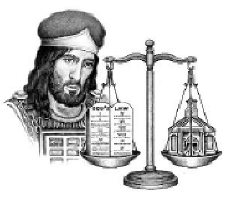 "He will magnify the law, and make it honourable"
Isaiah 42:21
"He will magnify the law, and make it honourable"
Isaiah 42:21
Lesson #16
SUNDAY IN THE NEW TESTAMENT
Jesus came to earth that man might have an accurate knowledge of God (John 1: 18). He made it clear that to know Him. our Lord and Saviour, was to know the Father (John 14:7).
By the advent of Christ in human flesh. the character and the law of God were magnified and the will of God was interpreted to men. Isaiah said of Christ. "He will magnify the law, and make it honourable" (Isaiah 42:21). Looking through the life and teachings of the Holy Saviour, we see God more clearly. and the beauty and application of His sacred law are made wonderfully clear and plain.
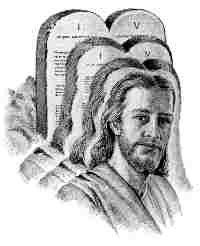 Through Christ we gaze into the depths of God's law as illustrated in Matthew
5:21-22, 27-28. Here we see that the law of God takes into account not only what
we do but what we think or would do if we could. The law, rightly interpreted,
has to do with the heart as well as with the outward conduct.
Through Christ we gaze into the depths of God's law as illustrated in Matthew
5:21-22, 27-28. Here we see that the law of God takes into account not only what
we do but what we think or would do if we could. The law, rightly interpreted,
has to do with the heart as well as with the outward conduct.
Yes, Jesus came to make the law honorable. The way to make the fourth, or Sabbath. commandment honorable is found in Isaiah 58: 13. We are to "call the Sabbath a delight, the holy of the Lord, honourable; and shalt honour Him." This. Jesus did while He was here on earth. But at that time the Jews had made the Sabbath a burden with their exaggerated ideas of Sabbath observance. They had added so many man-made laws to the Sabbath commandment that it no longer was a "delight," but became more and more a yoke of bondage. As such, it misrepresented the God whom Jesus came to reveal to men.
For example, no one was permitted to eat an egg that was laid on the Sabbath because the hen had violated the fourth commandment in doing work on the Sabbath. People were prohibited from walking on the grass for fear they might thresh out a few seeds. If they wore shoes with nails, it was considered as bearing a burden. They were permitted to write one letter of the alphabet, but not two letters. They could not carry a mouthful of food two steps on the Sabbath without bearing a burden.
It was such laws that Jesus ignored. But He did not ignore the Sabbath law itself as given in the Scriptures. Rather, He kept the Sabbath as a "delight." so that He might give an example in true Sabbathkeeping.
In the light of these facts. we ask questions. Was there any need for abolishing the Sabbath of God? No! The real need was to abolish the Sabbath regulations of the Jews. And this Jesus did.
But Christ never made any change in God's Ten Commandment law. Would He who came to "magnify the law, and make it honourable," or change it instead? How about the Sabbath commandment? Did He give any instruction about another day, telling us which day it is, what it commemorates, and how to keep it? If Jesus had changed the Sabbath, He would most certainly have made it known, and the record would be found in His New Testament, which contains the story of His life. Let us now turn to the record itself for the answer.
The first day of the week is mentioned eight times in the New Testament. This day we call Sunday. Did Christ intend that this day should replace the Bible Sabbath?
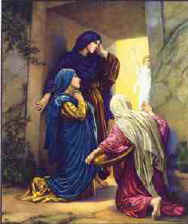 1 - THE TESTIMONY OF MATTHEW
1 - THE TESTIMONY OF MATTHEW
Matthew mentions the first day of the week but once.
Matthew 28:1- "In the end of the Sabbath, as it began to dawn toward the first day of the week, came Mary Magdalene and the other Mary to see the sepulchre."
This is a simple statement in connection with the story of the resurrection. It clearly sets forth the Sabbath as distinct from the first day of the week. The original Greek of Matthew 28: 1 has been misused in an effort to prove that the Sabbath was changed to the first day of the week, but only the uninformed, or those who wish to mislead the uninformed, would ever try to erect a Sabbath change on Matthew 28: 1.
The Revised Standard Version renders this verse in this way:
Matthew 28:1 (RSV)-"Now after the Sabbath, toward the dawn of the first day of the week, Mary Magdalene and the other Mary went to see the sepulchre."
So we see that Matthew is silent on the sanctity of the first day, or Sunday. And Jesus said nothing about the day at all, according to Matthew.
2 - THE TESTIMONY OF MARK
Mark mentions the first day of the week two times.
Mark 16:1-2- "And when the Sabbath was past, Mary Magdalene, and Mary the mother of James, and Salome, had brought sweet spices, that they might come and anoint Him. And very early in the morning the first day of the week, they came unto the sepulchre at the rising of the sun."
Mark 16:9- "Now when Jesus was risen early the first day of the week, He appeared first to Mary Magdalene, out of whom He had cast seven devils,"
Now let us look at these verses closely:
1. The Sabbath is "past" before the first day of the week begins.
Mark 16:1-2- "When the Sabbath was past. . very early in the morning the first day of the week."
2. Jesus was buried on the day before the Sabbath.
Mark 15:42-46- "And now when the even was come, because it was the preparation, that is. the day before the Sabbath. Joseph of Arimathaea, an honourable counsellor, which also waited for the kingdom of God, came. and went in boldly unto Pilate and craved the body of Jesus. And Pilate marvelled if He were already dead: and calling unto him the centurion, he asked him whether he had been any while dead. And when he knew it of the centurion, he gave the body to Joseph. And he bought fine linen, and took Him down, and wrapped Him in the linen, and laid Him in a sepulchre which was hewn out of a rock, and rolled a stone unto the door of the sepulchre."
3. Christ rested in the tomb during the Sabbath.
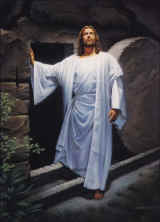 4. He rose from the dead the first day of the week.
4. He rose from the dead the first day of the week.
Mark 16:9- "Now when Jesus was risen early the first day of the week,"
5. He appeared first unto Mary.
Mark 16:9- "He appeared first to Mary Magdalene, out of whom He had cast seven devils,"
6. She told others who believed not.
Mark 16:10-11- "She went and told them that had been with Him. as they mourned and wept. And they, when they had heard that He was alive. and had been seen of her, believed not,"
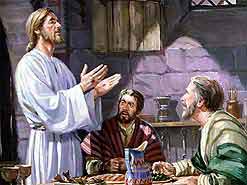 7. He appeared unto two followers.
7. He appeared unto two followers.
Mark 16:12- "After that He appeared in another form unto two of them. as they walked, and went into the country."
8. They reported to the disciples, who believed not.
Mark 16:13- "And they went and told it unto the residue: neither believed they them,"
9. Jesus appeared and upbraided the disciples for unbelief.
Mark 16:14- "Afterward He appeared unto the eleven as they sat at meat, and upbraided them with their unbelief and hardness of heart, because they believed not them which had seen Him after He was risen."
Jesus never mentioned the first day of the week as far as Mark's record is concerned. If Jesus did say anything about the matter, Mark did not consider it important enough to record. Mark does say that the Sabbath "was past"; therefore it is the day before the first day of the week. Ten years after Christ's death, resurrection, and ascension, Mark knew nothing whatever of any change, and incidentally mentions the first day of the week twice.
Both Mark and Christ are silent on the sanctity of Sunday.
3 . THE TESTIMONY OF LUKE
Luke mentions the first day of the week but once.
Luke 24:1- "Now upon the first day of the week, very early in the morning, they came unto the sepulchre, bringing the spices which they had prepared, and certain others with them."
According to Luke, Jesus' followers kept the Sabbath day before the first day came.
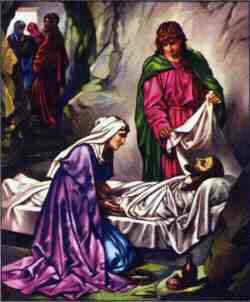 Luke 23:55-56-
"And the women also, which came with Him from
Galilee, followed after, and beheld the sepulchre, and how His body was laid.
And they returned. and prepared spices and ointments; and rested the Sabbath day
according to the commandment. "
Luke 23:55-56-
"And the women also, which came with Him from
Galilee, followed after, and beheld the sepulchre, and how His body was laid.
And they returned. and prepared spices and ointments; and rested the Sabbath day
according to the commandment. "
The day before the Sabbath was the preparation day which we commonly call Friday.
Luke 23:54- "And that day was the preparation, and the Sabbath drew on" (Mark 15:42).
Luke, like Mark, tells us of Jesus' appearance to two followers on the first day.
Luke 24:13-16- "And, behold, two of them went that same day to a village called Emmaus, which was from Jerusalem about threescore furlongs. And they talked together of all these things which had happened. And it came to pass that, while they communed together and reasoned, Jesus Himself drew near, and went with them. But their eyes were holden that they should not know Him." (Read the rest of the story in verses 17-32.)
Christ appeared to the terrified disciples on the first day. Read Luke 24:33-43.
Luke gives no record that Jesus ever referred to the first day of the week. He does point out that some of Jesus' followers "rested the Sabbath day according to the commandment" Naturally, this was according to the fourth commandment, but these close friends of Jesus never heard of any Sabbath change to Sunday. Both Mark and Luke give testimony that the disciples, on that resurrection Sunday, did not believe that Jesus had risen.
Luke and the Christ of his Gospel are silent on the sanctity of Sunday.
4 . THE TESTIMONY OF JOHN
John mentions the first day of the week twice.
John 20:1- "The first day of the week cometh Mary Magdalene early, when it was yet dark, unto the sepulchre, and seeth the stone taken away from the sepulchre."
John 20:19- "The same day at evening, being the first day of the week, when the doors were shut where the disciples were assembled for fear of the Jews, came Jesus and stood in the midst, and saith unto them, Peace be unto you."
Now let us get the picture here: Mary Magdalene came to the sepulcher early the first day.
John 20:1- "The first day of the week cometh Mary Magdalene early."
Later Jesus appeared to her (John 20:11-17).
Jesus appeared later that day to the disciples (John 20:19).
But they were not celebrating His resurrection that day, for they did not yet believe He had been raised from the dead.
To some degree, it seems that John had a deeper understanding of Jesus than his fellow disciples. However, John gives no record that Jesus ever mentioned the first day of the week. John and Christ are silent on the sanctity of Sunday. So the four Gospel writers who give us the record of Jesus' life are absolutely silent on any change of the Sabbath or any sanctity of Sunday.
5 - THE TESTIMONY OF THE BOOK OF ACTS
The first day of the week is mentioned only once in the book of Acts.
Acts 20:7- "And upon the first day of the week, when the disciples came together to break bread, Paul preached unto them, ready to depart on the morrow; and continued his speech until midnight."
The book of Acts records eighty-four Sabbath services and only one first-day service. This latter service is recorded in Acts 20:7-14. Paul spent a week at Troas. The evening after the Sabbath (Saturday night) he held a farewell meeting. It was night; there were lights, and he preached till midnight. The only way that it could be night and also be the "first day of the week" would be that this meeting at Troas was held on what we today call Saturday night. Bible days begin at sundown. When the sun goes down on Saturday, the first day of the week begins. Thus Paul's meeting was on Saturday night. The next day, Sunday morning, Paul walked nineteen miles to Assos to meet his fellow workers who had departed by ship and sailed thence. There is no Sunday sacredness here.
Conybeare and Howson: "It was the evening which succeeded the Jewish Sabbath" (The Life and Epistles of the Apostle, 520).
Now they broke bread, but the disciples broke bread daily (Acts 2:46). If this "bread breaking" was the Lord's Supper, it still would have no bearing upon Sunday sacredness; for it commemorates Christ's death that took place on Friday, but not His resurrection, because that took place on Sunday. The Lord's Supper may be celebrated on any day (1 Corinthians 11:26, for positive evidence).
So we see the book of Acts is silent on Sunday sanctity.
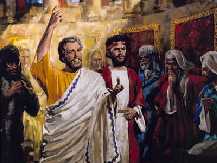
6 - THE TESTIMONY OF PAUL
Paul's epistles mention the first day of the week just once.
1 Corinthians 16:1-3- "Now concerning the collection for the saints, as I have given order to the churches of Galatia, even so do ye. Upon the first day of the week let every one of you lay by him in store, as God hath prospered him, that there be no gatherings when I come. And when I come, whomsoever ye shall approve by your letters, them will I send to bring your liberality unto Jerusalem."
Many have honestly supposed that this text indicated a weekly gathering.
However, it teaches just the contrary-"Let every one of you lay by him in store," which means privately or at home. Greek scholars testify to this. The believers would normally keep the Sabbath; and, after it was past, they figured their earnings of the week and set aside a gift portion for the poor.
Weymouth's translation (3d ed.) reads, "Let each of you put on one side and store up at his home." Translation after translation could be given to support what your own Bible clearly teaches. There is no evidence for a Sunday gathering of any kind. This was a collection that Paul desired to see accumulating in the homes of the Corinthian believers over a period of time, and that he wished to take to Jerusalem for poor believers. And so it is clear that Paul mentions the first day but once. And in that text he is utterly silent on first-day sanctity.
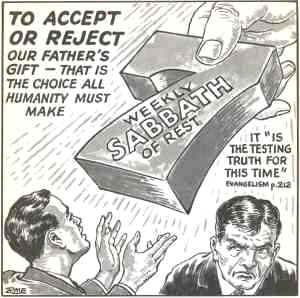 7 -
FACING THE ISSUE SQUARELY
7 -
FACING THE ISSUE SQUARELY
Jesus, our Creator and gracious Redeemer, gave us His holy Sabbath as a sign of creation and redemption. He gave it to us to be a delight. The Sabbath hours were given to afford time to reflect on the character of
God, to attend divine worship, and to perform acts of love and mercy.
He who is our example kept the Sabbath. He did not keep Sunday. In all the New Testament, there is no record that He personally ever once mentioned the first day of the week.
The custom of Sundaykeeping is a purely human invention, though millions of sincere Christians have kept the first day of the week with no knowledge of their responsibility to the true Sabbath. God has accepted the worship of these dear children of His. But when light comes, responsibility to walk in that light comes with it (1 John 1:7).
God is seeking to restore His Sabbath to its rightful place in the plan of redemption. And in your life, He is watching for that token of loyalty to truth that will lead you to honor Him fully. You will not disappoint Jesus, will you?
There are only eight New Testament verses which mention the first day of the week. Is Sunday sacredness in Matthew 28: 1?
Is Sunday sacredness given to us in Mark 16:1-2; Mark 16:9; Luke 23:55-56; Luke 24:1 ; or John 20:1?
In the above passages, the women would not bring spices to the tomb on the Sabbath, yet they were willing to do it on the first day, a common working day
Is Sunday sacredness shown us in Luke 24:13-16 or John 20: 19?
In the above passages, Jesus appeared to the disciples after His resurrection. The disciples were gathered together, so they could more easily hide from the Jews.
Is Sunday sacredness presented in Acts 20:7 or 1 Corinthians 16: 1 -3?
Regarding Acts 20: 7: In his travels, Paul held meetings day after day. After the night meeting on the first day in Troas (Acts 20:7), Paul held a meeting on Tuesday in Miletus (Acts 20:17-38). But no one considers that meeting sacred.
Regarding 1 Corinthians 16: 1-3, Paul told them to do their finances at home at the start of each work week, and get their donations ready, since he did not want to hold any meetings when he passed through town on his way to Jerusalem.

LETTER FROM THE ROMAN CATHOLIC CHURCH
We all like to receive mail. Here is a letter from the Roman Catholic Church, originally published in America in 1869. The message was written to Protestants and is forceful and to the point, with lots of Scriptural proofs for its position.
I am going to propose a very plain and serious question to those who follow 'the Bible and the Bible only' to give their most earnest attention. It is this: Why do you not keep holy the Sabbath Day'?
The command of Almighty God stands clearly written in the Bible in these words: 'Remember the Sabbath day, to keep it holy. Six days shalt thou labor, and do all thy work; but the seventh day is the Sabbath of the Lord thy God; in it thou shalt not do any work' (Exodus xx. 8-10). And again, "Six days shall work be done; but on the seventh day there shall be unto you an holy day, a Sabbath of rest to the Lord; whosover doeth work therein shall be put to death (Exodus xxxv. 2,3).
How strict and precise is God's commandment upon this head! [in this matter!] No work whatever was to be done on the day which He had chosen to set apart for Himself and to make holy. And, accordingly, when the children of Israel "found a man that gathered sticks upon the Sabbath day," "the Lord said unto Moses, The man shall surely be put to death; all the congregation shall stone him with stones without the camp" (Numbers xv. 32, 35). Such being God's command, then I ask again: Why do you not obey it? Why do you not keep holy the Sabbath day'?
You will answer me, perhaps, that you do keep holy the Sabbath day; for that you abstain from all worldly business and diligently go to church, and say your prayers, and read your Bible at home, every Sunday of your lives.
But Sunday is not the Sabbath day. Sunday is the first day of the week; the Sabbath day is the seventh day of the week. Almighty God did not give a commandment that men should keep holy one day in seven; but He named His own day, and said distinctly: 'Thou shalt keep holy the seventh day,' and He assigned a reason for choosing this day rather than any other-a reason which belongs only to the seventh day of the week, and cannot be applied to the rest. He says 'For in six days the Lord made heaven and earth, the sea and all that in them is, and rested the seventh day; wherefore the Lord blessed the Sabbath day and hallowed it' [Exodus xx. 11].
Almighty God ordered that all men should rest from their labor on the seventh day, because He too had rested on that day; He did not rest on Sunday, but on Saturday. On Sunday, which is the first day of the week, He began the work of creation, He did not finish it [then]; it was on Saturday that He 'ended His work which He had made; and He rested on the seventh day from all His work which He had made' (Genesis ii.
2). Nothing can be more plain and easy to understand than all this; and there is nobody who attempts to deny it; it is acknowledged by everybody that the day which Almighty God appointed to be kept holy was Saturday, not Sunday. Why do you then keep holy the Sunday, and not Saturday?
You will tell me that Saturday was the Jewish Sabbath [God gave the Bible Sabbath to mankind 2,000 years before the first Jew, Abraham, existed], but that the Christian Sabbath has been changed to Sunday; Changed! but by whom? Who has authority to change an express commandment of Almighty God? When God has spoken and said, Thou shalt keep holy the seventh day, who shall dare to say, Nay, thou mayest work and do all manner of worldly business on the seventh day; but thou shalt keep holy the first day in its stead? This is a most important question, which I know not how you can answer.
You are a Protestant, and you profess to go by the Bible and Bible only; and yet in so important a matter as the observance of one day in seven as a holy day, you go against the plain letter of the Bible, and put another day in the place of that day which the Bible has commanded. The command to keep holy the seventh day is one of the Ten Commandments; you believe that the other nine are still binding; but who gave you authority to tamper with the fourth? If you are consistent with your own principles. if you really follow the Bible and the Bible only, you ought to be able to produce some portion of the New Testament in which this fourth commandment is expressly altered.
Let us see whether any such passages can be found. I will look for them in the writings of your own [Protestant] champions. who have attempted to defend your practice in this matter.
1. The first text which I find quoted upon the subject is this: "Let no man judge you in respect of an holy day, or of the new moon, or of the new moon, or of the sabbath days" (Colossians it. 16). [That refers to the ceremonial-sacrificial yearly sabbaths of Leviticus 23. which were done away at the cross.] I could understand a Bible Christian imagining from this passage, that we ought to make no difference between Saturday. Sunday, and every other day of the week. But not one syllable does it say about the obligation of the Sabbath being transferred from one day to another.
2. Secondly. the words of St. John are quoted. "I was in the Spirit on the Lord's day (Apocalypse [Revelation] i. 10). Is it possible that anybody can for a moment imagine that here is a safe and clear rule for changing the weekly day of worship from the seventh to the first day? This passage is utterly silent upon such a subject; it only give Scriptural authority for calling some one day in particular (it does not even say which day) "the Lord's day."
3. Next we are reminded that St. Paul bade his Corinthian converts. "upon the first day of the week. lay by them in store. that there might be no gatherings" when he himself came (1 Corinthians xvi. 2). How is this supposed to affect the law of the Sabbath? It commands a certain act of almsgiving [doing one's finances at home] to be done on the first day of the week. It says absolutely nothing about not doing certain other acts of prayer and public worship on the seventh day.
4. But, you will say, it was "on the first day of the week" when the disciples were assembled within closed doors for fear of the Jews, and Jesus stood in the midst of them" (John xx,19). What is there in these facts to do away with the obligation of keeping holy the seventh day? Our Lord rose from the dead on the first day of the week, and on the same day at evening He appears to many of His disciples. Let Protestants, if they will [in obedience to Catholic tradition]. keep holy the first day of the week in grateful commemoration of that stupendous mystery, the Resurrection of Christ, and of the evidences which He vouchsafed to give of it to His doubting disciples; but this is no Scriptural authority for ceasing to keep holy another day of the week which God had expressly commanded to be kept holy for another and altogether different reason,
5. But lastly, we have the example of the Apostles themselves. "Upon the first day of the week, when the disciples came together to break bread. Paul preached unto them, ready to depart on the morrow; and continued his speech until midnight" (Acts xx. 7). Here we have clear proof that the disciples heard a sermon on a Sunday. But is that not proof they had done the same on the Saturdays also? [Acts xiii. 14. 42-44; xvi. 12-13; xvii, 1-2; xviiii. 1-4. 11]. [After the night meeting on the first day in Troas (Acts xx. 7), Paul held a meeting on Tuesday in Miletus (Acts xx, 17-38). But no one considers that meeting sacred.]
You will say, is it not expressly written concerning those early Christians, that they "continued daily with one accord in the temple, and breaking bread from house to house?" (Acts it. 46). As a matter of fact, do we not know from other sources that, in many parts of the church. the ancient Christians were in the habit of meeting together for public worship, and to perform the other [religious] offices, on Saturdays? Again then, I say, [in obedience to our command] let Protestants keep holy, if they will their first day of the week; but let them remember that this cannot possible release them from the obligation of keeping holy another day which Almighty God has ordered to be kept holy, because on that day He "rested from all His work." [The Troas meeting was held on Sunday in Acts 20:7. just prior to a Miletus meeting on Tuesday in Acts 20: 17-38. although no one today keeps Tuesday sacred because of that meeting].
I do not know of any other passages of holy Scripture which Protestants are in the habit of quoting to defend their practice of keeping holy the first day of the week, instead of the seventh; yet, surely those which I have quoted are not such as should satisfy any reasonable man, who looks upon the written Word of God as they [the Protestants] profess to look upon it, namely, as the only appointed means of learning God's will, and who really desires to learn and to obey that will in all things with humbleness and simplicity of heart. For in spite of all that anyone might say to the contrary, it is fully and absolutely impossible that a reasonable and thoughtful person should be satisfied, by the texts that I have quoted, that Almighty God intended the obligation of Saturday to be transferred to Sunday. And yet Protestants do so transfer it, and never seem to have the slightest misgivings lest, in doing so, they should be guilty of breaking one of God's commandments.
Why is this? Because, although they talk so largely about following the Bible and Bible only, they are really guided in this matter by the voice of [Roman Catholic] tradition. Yes, much as they may hate and denounce the word [tradition], they have in fact no other authority to allege for this most important change.
The present generation of Protestants keep Sunday holy instead of Saturday, because they received it as part of the Christian religion from the last generation, and that generation received it from the generation before, and so on backwards from one generation to another, by a continual succession, until we come to the time of the so-called "Reformation," when it so happened that those who conducted the change of religion [from Catholicism to Protestantism] left this particular portion of Catholic faith and practice untouched.
But, had it happened otherwise, -had some one or other of the "Reformers" taken it into his head to denounce the observance of Sunday as a Popish corruption and superstition, and to insist upon it that Saturday was the day which God had appointed to be kept holy, and that He had never authorized the observance of any other,- all Protestants would have been obliged, in obedience to their professed principle of following "the Bible and the Bible only," either to acknowledge this teaching as true, and to return to the observance of the ancient Sabbath, or else to deny that there is any Sabbath at all. And so, in like manner, anyone at the present day who should set about, honestly and without prejudice, to draw up for him self a form of religious belief and practice out of the written Word of God, must needs come to the same conclusion: He must either believe that the seventh-day Sabbath is still binding upon men's consciences, because of the Divine command, 'Thou shalt keep holy the seventh day,' or he must believe that no Sabbath at all is binding upon them. [Paul would have no right to abolish any of the Ten Commandments.] Either one of these conclusions he might come to;-but he would know nothing whatever of a "Christian Sabbath" distinct from the Biblical Sabbath, [that is] celebrated on a different day, and observed in a different manner,-simply because Holy Scripture itself nowhere speaks of such a thing.
Now, mind, in all this you would greatly misunderstand me if you supposed I was quarrelling with you for acting in this matter on a true and right principle,-in other words, a Catholic principle (viz., the acceptance, without hesitation, of that which has been handed down to you by an unbroken tradition). I would not tear from you a single one of those shreds and fragments of Divine truth [Catholic truth] which you have retained. God forbid! They are the most precious things you possess, and by God's blessing may serve as clues to bring you out of that labyrinth of [Protestant] error in which you find yourselves involved, far more by the fault of your forefathers three centuries ago [when they left Rome during the sixteenth- I century Reformation] than by your own.
What I do quarrel with you for, is not your inconsistency in occasionally acting on a true principle [such as Roman Catholic Sundaykeeping], but your adoption, as a general rule of a false one [your Protestant refusal to accept the rest of Roman traditional teachings; such as the Mass and the veneration of saints]. You keep the Sunday, and not the Saturday; and you do so rightly, for this was the practice of all Christians when Protestantism began [Catholic leaders erroneously say there were no Protestants prior to the sixteenth century]; but you have abandoned other Catholic observances which were equally universal at that day, preferring the novelties introduced by the men who invented Protestantism, to the unvarying tradition of above 1500 years [of Catholic teaching]. We blame you not for making Sunday your weekly holyday instead of Saturday, but for rejecting tradition [the sayings of the popes and councils of Rome), which is the only safe and clear rule by which this observance of Sunday) can be justified.
In outward act we do the same as yourselves in this matter; we too no longer observe the Sabbath, but Sunday in its stead; but there is this important difference between us, that we do not pretend -as you do -to derive our authority for so doing from a book [the Bible), but we [Catholics) derive it from a living teacher, and that teacher is the [Roman Catholic) Church. Moreover. we believe that not everything which God would have us to know and to do is written in the Bible, but that there is also an unwritten word of God [the sayings of popes and councils and canonized saints], which we are bound to believe and to obey.
We Catholics, then, have precisely the same authority for keeping Sunday holy instead of Saturday as we have for every other article of our creed. Namely, the authority of "the Church of the living God. and ground of truth" (1 Timothy iii. 15); whereas you who are Protestants have really no authority for it [Sunday sacredness) whatever; for there is no authority for it in the Bible, and you will not allow that there can be authority for it anywhere else. Both you and we do, in fact, follow [Catholic) tradition in this matter; but we follow it, believing it to be a part of God's word, and the [Catholic) Church to be its divinely appointed guardian and interpreter. You follow it [Catholicism), denouncing it all the time as a fallible and treacherous guide which often "makes the commandment of God of none effect" (Matthew xv. 6).
-"Why Don't You Keep Holy the Sabbath Day?" pages 3-15, in The Clifton Tracts, Vol. 4, published by the Roman Catholic Church. Originally released in North America in 1869 through the T. W. Strong Publishing Company of New York City, so that those outside the papal fold might return to the not partial, but full, authority of the Mother Church of the Vatican.